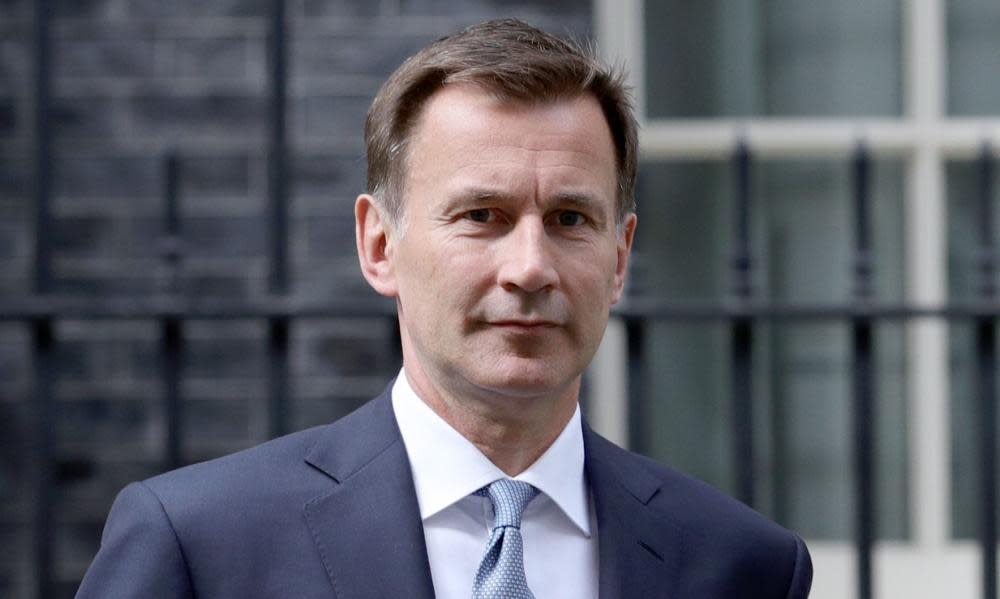Drug advisory panel candidate was blocked after criticism of Hunt

The chief pharmacist at a leading addiction service was blocked from rejoining the government’s drug advisory panel after social media checks revealed he had publicly criticised Jeremy Hunt, it has emerged.
Internal Home Office emails and memos released under a subject access request reveal it was noted that Graham Parsons, who served on the Advisory Council for the Misuse of Drugs (ACMD) from 2010 to 2013, had posted tweets “that were critical, in very strong personal terms, about the secretary of state for health” and were potentially offensive.
Parsons, the second well-respected expert to speak publicly about being blocked from membership of the ACMD in recent years after vetting by the Home Office, rejected a suggestion that his disapproval of Hunt’s policies while health secretary would have compromised his ability to give objective drug policy advice.
“The main issue I had was that they said my objectivity to give independent scientific advice would be hampered by my political views,” he said. “I strongly disagree with this. You base your advice on the evidence and expert consensus.”
The decision to block Parsons from the panel in November 2017 was signed off by Amber Rudd as home secretary. Since then the government’s relationship with drug policy experts has become increasingly fraught at a time of record drug-related deaths, budget cuts and criticism that the government is failing to adopt an evidence-based approach.
About half a dozen tweets mentioning Hunt between 2014 and 2015, while Parsons was working for an NHS clinical commissioning group, appear to have been flagged by the Home Office.
In the posts, Parsons voiced frank criticism of cuts and “top-down reorganisation” and warned that the health service would be “wrecked” by 2020, while accusing Hunt of using the NHS as a “political football”.
Facebook posts he made supporting junior doctors in their dispute with government and complaining of working conditions in hospitals were also flagged. One meme said: “It’s gotten to the point where I am working here to pay for the prescriptions I now require to cope with working here.”
Parsons also shared and commented on a number of posts by “Dr Rant”, who has made strident and aggressive criticism of Hunt and other ministers on social media, though it was unclear whether these were highlighted during the vetting.
“The tweets and commentary from Mr Parsons could be considered offensive, particularly with regard to the health secretary, and the comments made could suggest he may be unable to advise with objectivity,” a memo said.
An undelivered draft of a letter never sent to Parsons reveals that the Home Office took issue with his “failure to disclose” the comments, which it believed could cause embarrassment to the home secretary if they later came to light.
“Your failure to disclose this information at interview called into question your ability to uphold the seven principles of public ife,” it said. “For that reason, you were not considered suitable for appointment.”
Parsons – whose “excellent expertise” was noted by the Home Office independent advisory assessment panel that recommended his appointment – said he made no secret of his disapproval of Hunt’s policies in the interview process and had not thought the social media posts were significant.
Home Office emails also suggest the permanent secretary, Philip Rutnam, was not made aware of the decision before it was taken. Rutman swiftly called for a meeting to ask whether the appointments of Parsons and another expert had been vetoed owing to the “political due diligence checks”.
In October a criminal justice expert, Prof Alex Stevens, quit the ACMD over political interference in the appointment process, which he said fundamentally undermined the panel’s independence.
Niamh Eastwood, the director of the drug law charity Release, was blocked from the panel after publicly criticising government policy, calling for the decriminalisation of drugs and accusing the former crime minister Victoria Atkins of “making shit up”.
A government spokesperson said it was important that candidates to public bodies underwent “appropriate checks” to ensure they were suitable.
“Ministers are responsible for appointing members to the boards of public bodies and do so in line with the governance code for public appointments,” they said. “The commissioner for public appointments has highlighted the importance of due diligence checks, including relevant social media content, to inform ministers’ decisions.”
Asked how many other experts had been blocked after political vetting, the spokesperson did not respond.


